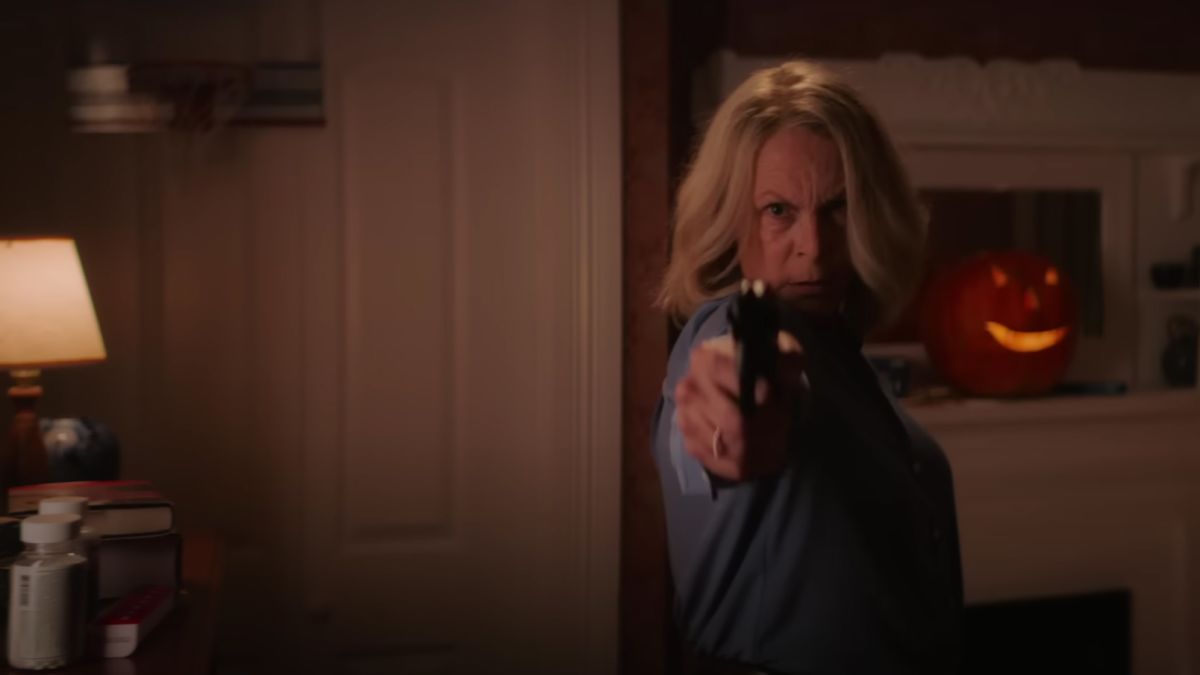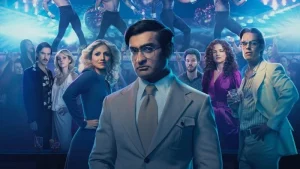
Insert obligatory joke about the total unlikelihood of this being the final entry in the Halloween franchise. Now that we are past that, we can examine how this is at least the end of David Gordon Green‘s take on the original slasher franchise. The 2018 sequel/reboot was a shockingly great film, one that we declared the best entry in the franchise since the original. Then came Halloween Kills, which was largely a trainwreck with misguided social commentary, and was a tonal mess between admittedly funny comedy bits and darker, gorier instincts.
Halloween Ends aims to stick a knife in this iteration of Michael Myers, Laurie Strode, and the other characters. It utilizes elements from both of the previous films. Dark, gory kills? Check. Attempts to provide deeper commentary on the human condition? Check. Sprinkling of black comedy? Check. While Green clearly has an interest in exploring the nature of evil throughout his trilogy, their true defining feature, for this entry in particular, is examining audience expectations and either subverting those expectations or playing to them.
That’s a fitting thing to do in a franchise that is now thirteen entries deep. People see Halloween movies to watch Michael Myers stab and kill people. There’s nothing elevated about that idea. Yet Green is interested in exploring whether or not these films can provide more insight, and whether audiences can go along with the ride.

The opening sequence of Ends is another masterwork in playing on expectations. We open on a Halloween night, with a babysitter watching his ward when an aura of menace descends. Green’s direction can never be faulted in these films, as he masterfully sets up tension and drama before slashing away your expectations and replacing it with something different. When it works, Green is able to mix truly dark humor with horror. The opening sequence truly dazzles in its brutality and plays upon what you think might be coming.
Yet Green’s writing is horribly uneven, a fact that severely hampered Kills and likewise hampers this effort. Green attempts to explore the infection of evil in a community, not through the idea of mob justice as in the previous movie, but by focusing on one character, Rohan Campbell‘s Corey, who struggles with the tragedy that occurred in the introduction and with his own darker nature.
This would seem an interesting idea, except that Green loses interest in it and Campbell’s character stops getting any meaningful development. So much in this film is skimmed or slid past that the entire logic of the story begins to fall apart. That’s nothing new for this franchise, but it is a shame when the ideas feinted at are at least mildly interesting. Green prefers to play his ideas out in long conversation scenes where characters debate or describe philosophical ideas in poorly-written dialogue that even the better actors struggle to deliver.
Jamie Lee Curtis gets to play a more prominent role in this film than in the prior entry, but she spends it monologuing in narration as she writes a memoir about her experiences with Michael Myers. One can imagine the overly-pretentious descriptions about fighting evil that ensue. Curtis does what she can to make it sound poignant instead of trite, but the script is just too poor on this point. Her character is also seemingly over all of her trauma, including her daughter’s death, until the film suddenly needs her not to be. She even has a fun little romance with Will Patton, whose character is still technically in these movies.
Michael Myers is ironically the sidelined character in this film, a daring move that Green deserves praise for making… except that being the ending of this version of the franchise, Myers can’t be fully sidelined, so the film backs out of the interesting direction it seemed to be taking. This creates an inconsistency in the evil of Michael Myers, which therefore becomes unsatisfying and stale. There is, though, a lovely last sequence that homages the ending of the original film in an unexpected way.
Halloween Ends is an improvement on Kills. It wisely avoids most of the silly attempted satire of that film, and its comedy is less broad. But Ends is still chalk-full of stupidity, inconsistent writing, and shallow social commentary. Green is definitely a good director, with lots of neat mixed L or J cuts in the audio and imagery, and with ample brutality when kills do happen. But he and Danny McBride should have resisted penning this entire trilogy, as they likely cut what may have been a great horror trilogy off at the knees due to their inability to write strong scripts. Despite finally letting Andi Matichak‘s character shine, even she is underserved by the under-baked romance she has with Campbell’s Corey.

There are far worse entries in the Halloween franchise than this trilogy. Green’s films at least have dared to try something fresh, and Ends has neat concepts and scenes. But like many of the better slasher entries, just a little more work on the script and writing would have massively improved it and turned it into something truly special. Ends is a lukewarm finale, but not to worry, a new entry will likely come along with a new take on an unending evil. Like Michael Myers, franchises never truly die.
Time to update our franchise ranking:
Franchise Ranking
- Halloween (1978)
- Halloween (2018)
- Halloween H20: 20 Years Later
- Halloween (2007)
- Halloween III: Season of the Witch
- Halloween 4: The Return of Michael Myers
- Halloween II (1981)
- Halloween Ends
- Halloween II (2009)
- Halloween Kills
- Halloween 5: The Revenge of Michael Myers
- Halloween: The Curse of Michael Myers



